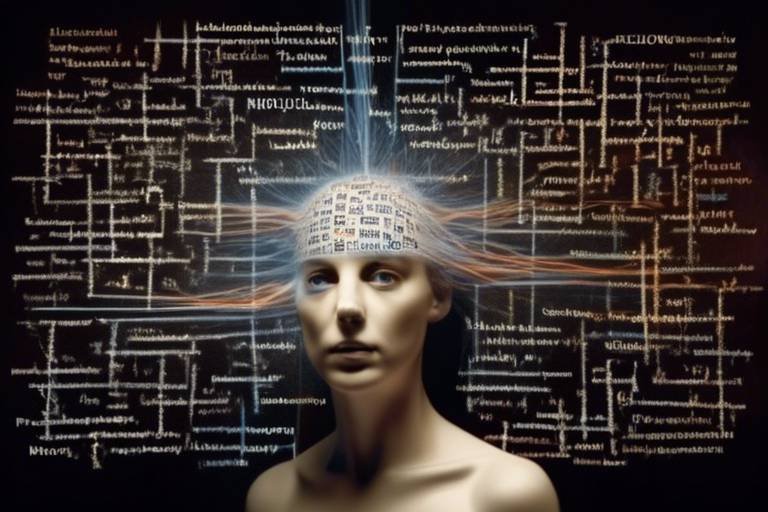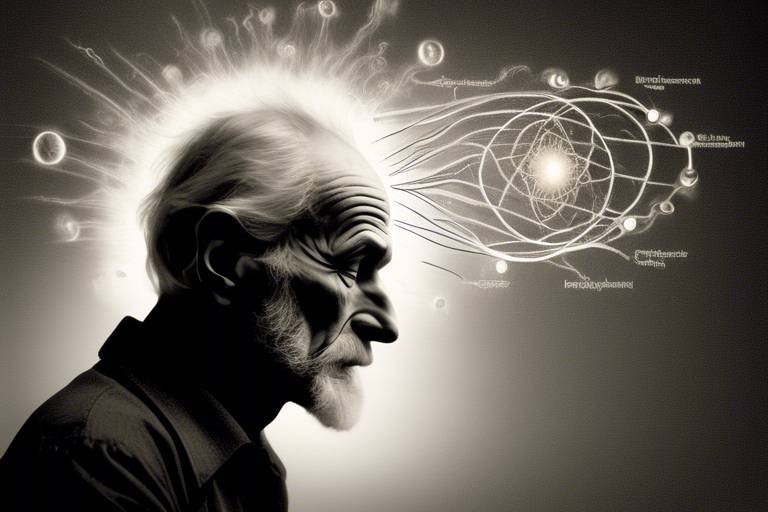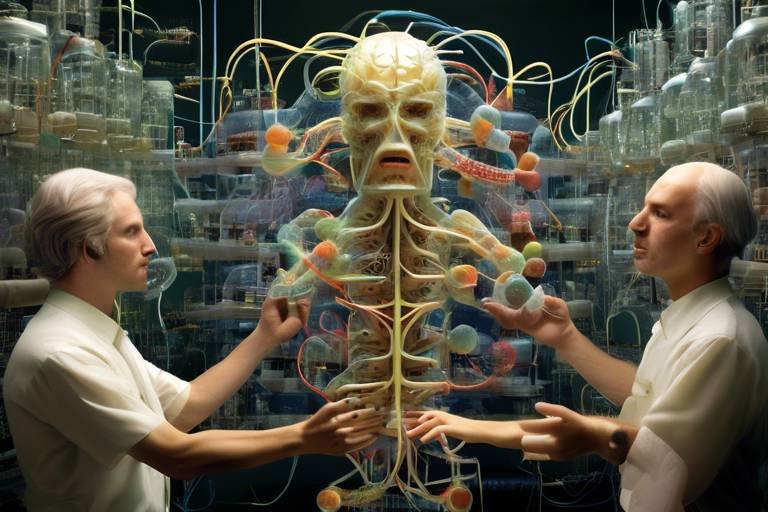Can Brain Mapping Solve Philosophical Dilemmas?
Welcome to a fascinating exploration of the intersection between neuroscience and philosophy! Have you ever pondered the deep questions of existence, like what makes us conscious or whether we truly have free will? If so, you're not alone. These age-old philosophical dilemmas have puzzled thinkers for centuries, and now, with the advent of brain mapping technologies, we might be closer to uncovering some answers. Imagine peering into the very fabric of the human mind, unraveling the mysteries of consciousness, decision-making, and moral responsibility. This article will delve into how brain mapping could reshape our understanding of these profound issues, sparking new debates and insights that challenge our traditional views.
Understanding consciousness is perhaps the most intriguing philosophical dilemma of all. What does it mean to be aware? Brain mapping technologies, such as functional magnetic resonance imaging (fMRI) and electroencephalography (EEG), allow researchers to visualize brain activity in real-time. This capability opens a window into the conscious experience, revealing how different brain regions interact during moments of awareness. For example, when we engage in deep thought, certain areas of our brain light up, indicating a complex network of activity. This newfound ability to observe consciousness could lead to revolutionary implications for philosophical thought. Are our conscious experiences merely byproducts of neurological processes? Or is there something more profound at play?
The debate between free will and determinism is a profound philosophical conundrum. Are our choices genuinely our own, or are they predetermined by a series of biological and environmental factors? This is where brain mapping comes into play. By examining the neurological processes involved in decision-making, we can gain insights into how our brains function when we make choices. For instance, studies have shown that certain brain activity patterns can predict decisions seconds before we are consciously aware of them. This raises an unsettling question: if our brains can forecast our choices, do we truly have free will, or are we simply following a predetermined path?
Diving deeper into the neuroscience of decision-making reveals a complex interplay of cognitive functions and emotional responses. Brain mapping has uncovered that different regions of the brain are responsible for various aspects of decision-making. For instance, the prefrontal cortex is crucial for weighing options and considering consequences, while the amygdala is involved in emotional responses. This intricate dance between rational thought and emotional impulse suggests that our decisions are not merely logical but are influenced by a myriad of factors. Understanding these mechanisms can help us grasp the philosophical implications of our choices and the extent to which they are influenced by our biology.
The relationship between decision-making and moral responsibility is a critical area of discussion. If our choices are influenced by neurological processes, what does that mean for accountability? Brain mapping insights could challenge traditional views on moral responsibility, suggesting that individuals may not be entirely to blame for their actions if those actions are rooted in biological determinism. This perspective invites us to reconsider how we approach justice and punishment in society. Should we hold individuals accountable for actions that may stem from their brain's wiring?
To illustrate the complexities of free will, consider several case studies where brain mapping has been applied. For instance, researchers have studied individuals with neurological disorders that affect decision-making, revealing how brain injuries can alter one's ability to make choices. These case studies highlight the nuances of free will and the factors that can undermine our sense of agency. Such findings prompt us to reflect on the nature of autonomy and the extent to which we are the authors of our actions.
Different philosophical schools offer varied interpretations of findings from brain mapping. Some argue that neuroscience supports a deterministic view, while others contend that it complements the idea of free will. For instance, compatibilists believe that free will and determinism can coexist, suggesting that understanding the brain's workings enhances our comprehension of human agency. Engaging with these philosophical perspectives can help us navigate the complex landscape of consciousness and free will, providing a richer understanding of our existence.
As brain mapping technology advances, ethical dilemmas inevitably arise. The potential to delve into the inner workings of the mind raises significant moral questions. For instance, what are the implications of using brain mapping in philosophical inquiry? Could it lead to a more profound understanding of human behavior, or might it compromise individual privacy? These questions are critical as we consider the impact of brain mapping on society and the ethical responsibilities of researchers.
The use of brain mapping technology raises pressing questions about privacy and consent. As researchers gain the ability to observe brain activity, they must navigate the ethical landscape surrounding personal autonomy. Individuals have the right to control access to their thoughts and experiences, and researchers must ensure they uphold these rights. This section examines the ethical responsibilities that come with brain mapping and the potential risks to individual autonomy.
Looking ahead, the future of brain mapping in philosophical discourse is filled with possibilities. As technology continues to evolve, we can expect new methods and insights that will further influence our understanding of complex philosophical issues. Imagine a world where we can explore consciousness in unprecedented detail, leading to breakthroughs that challenge our most fundamental beliefs. The intersection of neuroscience and philosophy is a thrilling frontier, one that promises to reshape our comprehension of what it means to be human.
- What is brain mapping? Brain mapping refers to various techniques used to visualize and understand brain activity, including fMRI and EEG.
- How does brain mapping relate to philosophy? Brain mapping can provide insights into philosophical questions about consciousness, free will, and moral responsibility.
- Can brain mapping prove free will exists? While brain mapping can inform the debate, it does not provide definitive proof for or against free will.
- What ethical concerns arise from brain mapping? Key concerns include privacy, consent, and the potential misuse of brain data.
- What is the future of brain mapping in philosophy? The future may bring new technologies and insights that further challenge our understanding of consciousness and human agency.

The Nature of Consciousness
Understanding consciousness is like trying to catch smoke with your bare hands; it’s elusive, complex, and has baffled philosophers for centuries. What does it mean to be conscious? Are we merely biological machines, or is there something more profound at play? With the advent of brain mapping technologies, we now have tools that can help illuminate this age-old mystery. By visualizing brain activity, we can begin to understand how our thoughts, feelings, and perceptions come together to form our conscious experience.
Brain mapping utilizes advanced techniques like functional MRI (fMRI) and electroencephalography (EEG) to observe brain activity in real-time. These technologies allow researchers to see which areas of the brain are engaged during specific tasks or experiences. For instance, when a person engages in deep thought or experiences an emotion, particular regions of the brain light up, revealing the intricate workings behind our conscious mind.
But what does this mean for philosophy? It challenges us to rethink the very fabric of consciousness. Traditionally, philosophers have debated whether consciousness is a byproduct of physical processes or an independent entity. Brain mapping suggests that our conscious experiences are closely tied to measurable brain activity, implying that consciousness may not exist in a vacuum but is deeply rooted in our biological makeup. This brings us to some profound questions:
- Is consciousness merely a reflection of neural activity?
- Can we truly separate the mind from the brain?
- What implications does this have for our understanding of self-awareness?
As we delve deeper into the neural correlates of consciousness, we encounter the fascinating concept of the neural correlates of consciousness (NCC). These are specific brain states that correspond with conscious experience. Identifying these correlates could help us answer questions about the nature of subjective experiences—like why we feel joy or sadness in response to certain stimuli. The implications are staggering; if we can pinpoint the neural basis for these experiences, we might be able to manipulate them, leading to possibilities like enhancing happiness or alleviating suffering.
Yet, as we explore this intersection of neuroscience and philosophy, we must tread carefully. The conclusions drawn from brain mapping should not be taken as definitive answers but rather as stepping stones toward a more nuanced understanding of consciousness. It’s essential to remember that while brain mapping provides valuable insights, it does not encompass the entirety of what it means to be conscious. After all, consciousness is not just about brain activity; it’s also about the rich tapestry of experiences, emotions, and thoughts that define our existence.
In summary, brain mapping opens a fascinating window into the nature of consciousness. It invites us to explore questions that have lingered in the philosophical realm for ages, potentially leading us to a more profound understanding of what it means to be aware. As we continue to investigate, we may find that the answers are as complex and layered as consciousness itself.

Free Will vs. Determinism
The debate between free will and determinism has puzzled philosophers for centuries. At its core, this dilemma questions whether we are truly the architects of our actions or merely puppets dancing to the strings of fate. Imagine standing at a crossroads, where one path represents the freedom to choose your destiny, while the other signifies a preordained route laid out by the universe. This tension between choice and inevitability is not just philosophical; it has profound implications for how we understand ourselves and our actions.
Brain mapping technology has emerged as a fascinating tool that can shed light on this age-old question. By examining the neurological processes that underlie our decision-making, we can begin to unravel the intricate web of influences that shape our choices. For instance, when we make a decision, what happens in our brains? Are we aware of all the factors at play, or are many of them subconscious? These inquiries can lead us to reconsider the very nature of agency.
One of the compelling aspects of this discussion is how brain mapping reveals the complex interplay between various brain regions during decision-making. Studies have shown that certain areas, like the prefrontal cortex, are heavily involved in weighing options and considering consequences. But what if these neural patterns indicate that our choices are not as free as we think? If our brains are wired in such a way that they predispose us to make certain choices, does that mean our free will is compromised?
To better understand the implications of these findings, let’s consider a few key points:
- Neural Predispositions: Brain mapping studies have suggested that our neural circuits can predispose us to specific behaviors, raising questions about the authenticity of our choices.
- Conscious vs. Unconscious Decisions: Many decisions are made unconsciously, which could imply that free will is an illusion, as we often act based on subconscious impulses.
- Environmental Influences: Our choices are not made in a vacuum; they are influenced by our environment, upbringing, and even biological factors, complicating the notion of free will.
Despite these revelations, it’s essential to recognize that the debate is far from settled. Different philosophical schools interpret brain mapping findings in various ways. Some argue that even if our choices are influenced by biological and environmental factors, we still possess the capacity to choose differently in any given situation. Others contend that if our decisions are fundamentally shaped by these influences, then true free will is merely an illusion.
As we delve deeper into the neuroscience of decision-making, the lines between free will and determinism blur. It opens up a new realm of questions: If our choices are influenced by brain activity that we are not consciously aware of, how do we define responsibility? Are we accountable for actions that our brains were predisposed to take? These questions are not just academic; they have real-world implications for our legal systems, moral frameworks, and personal relationships.
In conclusion, the intersection of brain mapping and the free will versus determinism debate presents a thrilling frontier in both neuroscience and philosophy. It challenges us to rethink our understanding of what it means to be human. As technology advances, we may find ourselves closer to answers that could redefine our perception of autonomy and responsibility. Will we ultimately discover that we are the captains of our fate, or will we find that our destinies are written in the very fabric of our neural circuits?

Neuroscience of Decision-Making
When we talk about the , we’re diving into a fascinating realm where brain activity meets the choices we make every day. Imagine your brain as a bustling city, with neurons acting like busy traffic lights, guiding the flow of information and decisions. Each choice we make, from what to eat for breakfast to larger life-altering decisions, is influenced by a complex interplay of neural pathways and brain regions. Recent advancements in brain mapping technologies, such as functional Magnetic Resonance Imaging (fMRI), have allowed scientists to visualize these processes in real-time, shedding light on the intricate mechanics behind our choices.
At the heart of decision-making lies the prefrontal cortex, often dubbed the "executive" region of the brain. This area is responsible for higher-order functions, including reasoning, planning, and social behavior. When we face a decision, this part of the brain evaluates potential outcomes, weighing risks and rewards much like a seasoned gambler at a poker table. But it’s not just the prefrontal cortex at play; a network of regions, including the amygdala and the striatum, also contribute to how we decide. The amygdala, for instance, plays a critical role in processing emotions and can influence decisions based on fear or pleasure, while the striatum is involved in reward processing, helping us to assess the value of different choices.
Interestingly, brain mapping has revealed that many decisions are made unconsciously before we even become aware of them. This phenomenon raises profound questions about free will and autonomy. Are we truly in control of our choices, or are they predetermined by neural activity occurring beyond our conscious awareness? Researchers have conducted experiments where they measure brain activity before participants consciously decide to make a choice, revealing that the brain often 'decides' milliseconds before we are aware of it. This finding can feel unsettling, as it challenges our traditional notions of personal agency.
To illustrate this point, consider the following table summarizing key brain regions involved in decision-making:
| Brain Region | Function |
|---|---|
| Prefrontal Cortex | Higher-order reasoning, planning, and decision-making |
| Amygdala | Emotion processing and fear responses |
| Striatum | Reward processing and value assessment |
| Anterior Cingulate Cortex | Conflict monitoring and error detection |
As we continue to explore the neuroscience behind our decisions, it becomes increasingly clear that understanding the brain's mechanisms can provide profound insights into human behavior. The implications extend far beyond academic interest; they touch on ethics, personal responsibility, and even the legal system. If our decisions are influenced by neural processes, what does that mean for accountability? Can we hold individuals responsible for actions that may be, in part, the result of brain function beyond their control?
In conclusion, the neuroscience of decision-making is a captivating field that not only enhances our understanding of how we make choices but also opens the door to deeper philosophical inquiries about the nature of free will and moral responsibility. As we unravel these complexities, we must remain vigilant about the ethical implications of our findings and how they shape our understanding of what it means to be human.
- What is brain mapping? Brain mapping refers to a set of techniques used to visualize the structure and function of the brain, often using imaging technologies like fMRI.
- How does brain mapping help in understanding decision-making? It allows researchers to observe brain activity in real time, revealing which areas are involved in the decision-making process.
- Does brain mapping challenge the concept of free will? Yes, findings suggest that many decisions may occur unconsciously, prompting questions about the extent of our control over choices.
- What are the ethical implications of brain mapping? Ethical concerns include privacy, consent, and the potential misuse of brain data in determining accountability and responsibility.

Implications for Moral Responsibility
When we dive into the realm of moral responsibility, we often find ourselves grappling with profound questions: Are we truly accountable for our actions, or are we simply products of our biology and environment? With the advent of brain mapping technologies, these questions take on new dimensions. Imagine a world where our thoughts, decisions, and even our moral compasses are laid bare in a neurological landscape. This is the promise—and the peril—of brain mapping.
Brain mapping offers us a glimpse into the intricate workings of the human brain, revealing how our neural pathways influence our decision-making processes. For instance, when we consider a moral dilemma, specific areas of our brain light up, indicating the cognitive and emotional processes at play. This raises an intriguing question: if our decisions can be traced back to neural activity, to what extent can we hold individuals accountable for their actions? Are we merely following the wiring of our brains, or is there room for genuine agency?
To further illustrate this point, let's consider a hypothetical scenario: imagine a person who commits a crime. Traditional views of moral responsibility would hold this individual accountable for their actions. However, if brain mapping reveals that this person has a neurological condition that impairs their decision-making capabilities, how does that change our perception of their culpability? Are they still morally responsible, or do we need to consider the role of their brain's dysfunction?
In light of these considerations, we must also examine the potential societal implications. If brain mapping can identify individuals predisposed to certain behaviors, could we be tempted to preemptively judge or even punish individuals based on their brain patterns? This slippery slope raises ethical concerns about determinism versus free will, and the very essence of what it means to be human.
Furthermore, the concept of moral responsibility is deeply intertwined with our legal systems. As neuroscience progresses, courts may be faced with the challenge of integrating brain mapping findings into legal arguments. For example, if a defendant's brain scans indicate diminished capacity due to a neurological disorder, should this be a mitigating factor in sentencing? The implications are vast and complex, necessitating a reevaluation of how we define accountability in both moral and legal contexts.
To summarize, the intersection of brain mapping and moral responsibility presents a rich tapestry of questions that challenge our traditional views. As we continue to explore these technologies, it is crucial to engage in open dialogues about their implications, ensuring that we navigate the ethical landscape with care and consideration.
- What is brain mapping? Brain mapping refers to the techniques used to visualize the structure and function of the brain, often through imaging technologies like fMRI or PET scans.
- How does brain mapping relate to moral responsibility? Brain mapping can reveal the neurological processes behind decision-making, raising questions about the extent of individual accountability for actions.
- Can brain mapping predict behavior? While brain mapping can identify certain predispositions, predicting behavior with absolute certainty remains a complex challenge.
- What are the ethical concerns surrounding brain mapping? Ethical concerns include issues of privacy, consent, and the potential for misuse of neurological data in legal or social contexts.

Case Studies in Free Will
The exploration of free will through brain mapping technologies has led to fascinating case studies that challenge our traditional understanding of human agency. One notable case involved a group of participants who underwent brain scans while making decisions in a controlled environment. Researchers discovered that specific brain activities preceded conscious decision-making by several seconds. This finding raised eyebrows—if our brains are 'deciding' before we are even aware of it, what does that say about our free will?
Another intriguing case study examined individuals with neurological disorders affecting their decision-making processes. For instance, patients with damage to the prefrontal cortex exhibited impulsive behavior and poor judgment, suggesting that their ability to exercise free will was compromised. This leads to the question: Are we truly in control of our actions, or are we merely puppets of our neural wiring? The implications are profound, as they push us to rethink the foundations of moral responsibility.
Additionally, studies involving individuals who have undergone brain stimulation to enhance cognitive functions have shown that altering brain activity can influence decision-making. In one experiment, participants who received stimulation to the right dorsolateral prefrontal cortex were more likely to make risk-averse choices compared to a control group. This raises an ethical dilemma: if we can manipulate decision-making processes, to what extent can we hold individuals accountable for their choices?
These case studies illustrate a crucial point: the intersection of neuroscience and philosophy is not just theoretical; it has real-world implications. As we delve deeper into the workings of the human brain, we are forced to confront uncomfortable truths about our nature. Are we the architects of our destinies, or are we simply navigating a path laid out by our biology? The answers may not be as clear-cut as we once believed.
In summary, the findings from these case studies compel us to re-examine the concept of free will. As brain mapping technologies continue to evolve, so too will our understanding of the intricate dance between biology and choice. The dialogue between neuroscience and philosophy is just beginning, and it promises to unveil more layers of complexity regarding our understanding of human agency.
- What is brain mapping? Brain mapping refers to a set of neuroscience techniques used to visualize and understand the structure and function of the brain.
- How does brain mapping relate to free will? Brain mapping can reveal the neural processes behind decision-making, challenging traditional notions of free will.
- Are there ethical concerns with brain mapping? Yes, issues such as privacy, consent, and the potential for manipulation raise important ethical questions.
- Can brain mapping determine moral responsibility? Insights from brain mapping can complicate our understanding of moral responsibility, as they suggest that some decisions may be influenced by neurological factors beyond our control.
- What are the future directions for brain mapping in philosophy? Emerging technologies may continue to reshape our understanding of consciousness, free will, and moral responsibility.

Philosophical Perspectives
When we dive into the realm of regarding brain mapping, we encounter a rich tapestry of thoughts that span centuries. Different schools of philosophy provide unique lenses through which we can interpret brain mapping findings. For instance, empiricists argue that knowledge arises from sensory experience, suggesting that brain mapping could be a vital tool in understanding consciousness. They might contend that by observing brain activity, we can gain insights into how experiences shape our understanding of the world.
On the other hand, rationalists emphasize the role of reason and innate ideas. They may question whether brain mapping can truly capture the essence of consciousness or if it merely reflects physical processes without addressing the deeper, subjective experiences of individuals. This leads to intriguing discussions about whether our thoughts and feelings can be reduced to mere brain activity or if they transcend the physical realm.
Moreover, the phenomenological perspective focuses on the lived experience of consciousness. Proponents of this view may argue that while brain mapping can provide valuable data, it fails to account for the first-person perspective that defines human experience. They might posit that understanding consciousness requires more than just observing neural patterns; it necessitates an appreciation of the richness of subjective experience.
To illustrate these perspectives, consider the following table that summarizes how various philosophical schools interpret the implications of brain mapping:
| Philosophical School | View on Brain Mapping |
|---|---|
| Empiricism | Supports the use of brain mapping as a means to understand consciousness through observable data. |
| Rationalism | Questions the ability of brain mapping to capture the essence of consciousness beyond physical processes. |
| Phenomenology | Emphasizes the importance of subjective experience, suggesting that brain mapping alone is insufficient. |
As we navigate these philosophical waters, it becomes evident that brain mapping is not just a scientific endeavor; it is also a philosophical one. Each perspective brings its own set of questions and challenges, prompting us to reconsider what we believe about the nature of consciousness and free will. Can we truly understand the mind through the lens of neuroscience, or are we merely scratching the surface of a much deeper mystery?
Ultimately, the dialogue between neuroscience and philosophy is ongoing, with each discipline enriching the other. As brain mapping technologies advance, they will undoubtedly spark new debates and insights, challenging our long-held beliefs and inviting us to explore the complexities of the human experience in ways we have yet to imagine.
- What is brain mapping? Brain mapping refers to a set of techniques used to visualize the structure and function of the brain.
- How does brain mapping relate to philosophy? Brain mapping provides empirical data that can inform philosophical discussions about consciousness, free will, and moral responsibility.
- Can brain mapping answer philosophical questions? While it can provide insights, many philosophers argue that it may not fully capture the subjective nature of human experience.
- What are the ethical implications of brain mapping? Ethical concerns include privacy, consent, and the potential misuse of brain data in various contexts.

Ethical Considerations
As we delve deeper into the realm of brain mapping, it's essential to address the that accompany this groundbreaking technology. The intersection of neuroscience and philosophy opens up a Pandora's box of moral dilemmas that society must navigate. With the ability to visualize and analyze the brain's inner workings, we are faced with questions that challenge our understanding of privacy, consent, and the very essence of what it means to be human.
One of the most pressing concerns is the issue of privacy. Brain mapping technologies can reveal intimate details about an individual's thoughts, emotions, and even their predispositions to certain behaviors. Imagine a world where employers could access brain scans to determine a candidate's suitability for a role based on their mental state or thought patterns. This raises alarming questions: Who owns the data generated by our brains? How can we ensure that this information is not misused? The potential for abuse is significant, and society must establish robust frameworks to protect individuals from such invasions of privacy.
Alongside privacy, the matter of consent cannot be overlooked. In a landscape where brain mapping is increasingly accessible, informed consent becomes crucial. Participants in research studies must fully understand what they are agreeing to, including the potential risks and implications of their involvement. Researchers have a moral obligation to ensure that individuals are not coerced or manipulated into participating in studies that could have profound implications for their lives. This is particularly important in vulnerable populations, where the stakes are even higher.
Moreover, the implications of brain mapping extend to our understanding of moral responsibility. If our thoughts and actions can be traced back to neurological processes, does that undermine the concept of free will? If a person commits a crime, can we hold them accountable when their brain activity suggests they were predisposed to such behavior? These questions challenge the very foundations of our legal and ethical systems, prompting a reevaluation of how we assign blame and responsibility.
To illustrate these ethical dilemmas, consider the following table that summarizes key ethical concerns associated with brain mapping:
| Ethical Concern | Description |
|---|---|
| Privacy | Potential invasion of personal thoughts and mental states. |
| Consent | Need for informed and voluntary participation in studies. |
| Moral Responsibility | Implications for accountability in criminal behavior. |
| Data Ownership | Questions surrounding who owns and controls brain data. |
The ethical implications of brain mapping are not just theoretical; they have real-world consequences that could shape the future of society. As we continue to explore the depths of the human brain, it is vital to engage in ongoing discussions about these ethical considerations. By doing so, we can ensure that the advancements in neuroscience serve humanity positively and equitably.
- What is brain mapping? Brain mapping refers to the techniques used to visualize and analyze brain activity and structure, often using technologies like fMRI and EEG.
- Why are ethical considerations important in brain mapping? Ethical considerations are crucial to protect individuals' rights and privacy, ensuring that advancements in neuroscience do not infringe upon personal autonomy.
- How can we ensure informed consent in brain mapping studies? Researchers must provide clear, comprehensive information about the study's purpose, risks, and benefits, allowing participants to make informed decisions.
- What are the implications of brain mapping for moral responsibility? Brain mapping raises questions about whether individuals can be held accountable for actions if their decisions are influenced by neurological factors.

Privacy and Consent
As we delve into the fascinating realm of brain mapping, one cannot help but stumble upon the intricate web of . These two pillars are not just legal requirements; they are fundamental ethical considerations that shape the landscape of neuroscience. Imagine having your thoughts, emotions, and decisions mapped out and analyzed. Sounds like something out of a sci-fi movie, right? Yet, this is becoming a reality as technology advances.
When researchers utilize brain mapping technologies, they often collect sensitive data that reveals intimate details about an individual's mental processes. This raises the question: how much of our mental landscape are we willing to share? The idea of consent in this context is paramount. It’s not just about signing a form; it’s about understanding what you’re signing up for. Participants should be fully informed about how their data will be used, who will have access to it, and the potential implications of that access.
Moreover, the concept of informed consent becomes even more complex in the context of brain mapping. Many individuals may not fully grasp the intricacies of their neurological data or the potential consequences of its use. This lack of understanding can lead to a false sense of security, where participants believe they are protected when, in reality, they are not. The responsibility lies heavily on researchers to ensure transparency and clarity throughout the process.
Additionally, the potential for misuse of brain mapping data is a genuine concern. Imagine if this information fell into the wrong hands—employers, insurance companies, or even malicious entities could exploit it. This possibility begs the question: how do we safeguard our cognitive privacy? Establishing robust ethical guidelines and regulations is essential to protect individuals from potential abuses.
To address these concerns, it's crucial to consider the following aspects:
- Data Security: Measures must be implemented to protect sensitive information from unauthorized access.
- Participant Autonomy: Individuals should have the right to withdraw their consent at any time without facing repercussions.
- Ethical Oversight: Independent review boards should monitor research practices to ensure ethical standards are upheld.
As we navigate this uncharted territory, the dialogue surrounding privacy and consent in brain mapping must continue to evolve. Society must grapple with these ethical dilemmas, balancing the pursuit of knowledge with the fundamental rights of individuals. Ultimately, the goal should be to foster an environment where scientific advancement does not come at the expense of personal privacy and autonomy.
- What is brain mapping? Brain mapping refers to techniques used to study the structure and function of the brain, often involving imaging technologies.
- Why is privacy important in brain mapping? Privacy is crucial because brain mapping can reveal sensitive information about an individual's thoughts and emotions, which could be misused.
- What is informed consent? Informed consent is the process by which participants are fully educated about the research and agree to partake, understanding the risks involved.
- How can I ensure my privacy is protected in research? Always inquire about how your data will be used, stored, and shared, and ensure that the research has ethical oversight.

Future Directions
As we gaze into the horizon of neuroscience and philosophy, the future of brain mapping holds immense potential that could reshape our understanding of the mind and its intricate workings. Imagine a world where we can not only visualize the brain's activity in real-time but also decode the very essence of our thoughts and emotions. This isn't just science fiction; it's a rapidly approaching reality. With advancements in technology, such as functional magnetic resonance imaging (fMRI) and electroencephalography (EEG), researchers are beginning to unravel the complexities of consciousness and decision-making.
One of the most exciting prospects lies in the integration of artificial intelligence (AI) with brain mapping technologies. By leveraging AI algorithms, scientists could potentially analyze vast amounts of neural data, identifying patterns that were previously undetectable. This could lead to breakthroughs in understanding how we perceive reality, make decisions, and even how we experience emotions. For instance, imagine an AI system that could predict a person's emotional response to a situation based solely on their brain activity. This could revolutionize fields like psychology and psychotherapy, allowing for more tailored and effective treatments.
Moreover, the ethical implications of such advancements cannot be overlooked. As we develop the ability to map and interpret thoughts, questions about privacy and consent will become even more pressing. Who owns the data generated by brain mapping? How can we ensure that this powerful technology is used responsibly? These are the conversations that need to be had as we move forward. The intersection of brain mapping and ethics will likely spawn new philosophical debates, challenging our traditional views on autonomy and personal identity.
In addition, the application of brain mapping in educational settings is an area ripe for exploration. By understanding how different brains learn and process information, educators could tailor their teaching methods to fit individual needs. Imagine classrooms where lessons are customized based on real-time feedback from students' brain activity. This personalized approach could enhance learning outcomes and foster a more engaging educational environment.
Furthermore, brain mapping may also play a significant role in the realm of mental health. As we continue to uncover the neural correlates of various psychological conditions, targeted therapies could be developed that address the root causes of disorders rather than just the symptoms. This could lead to more effective treatments for conditions such as depression, anxiety, and PTSD, ultimately improving the quality of life for millions.
As we ponder these future directions, it's essential to remain grounded in the philosophical implications of our discoveries. Each leap forward in brain mapping technology invites us to reconsider age-old questions about consciousness, free will, and moral responsibility. Will we find definitive answers, or will we uncover even more profound mysteries? The journey ahead promises to be as enlightening as it is challenging, and as we navigate this uncharted territory, it is crucial to engage in ongoing dialogue among scientists, philosophers, and ethicists.
- What is brain mapping? Brain mapping is a collection of techniques used to visualize the structure and function of the brain, often through imaging technologies like fMRI and EEG.
- How can brain mapping inform philosophical discussions? By revealing the neurological underpinnings of consciousness and decision-making, brain mapping can provide empirical data that informs philosophical debates on free will and moral responsibility.
- What ethical concerns arise from brain mapping? Ethical concerns include issues of privacy, consent, and the potential misuse of brain data, raising questions about individual autonomy and data ownership.
- What are the future applications of brain mapping? Future applications may include personalized education, enhanced mental health treatments, and AI integration to analyze neural data for deeper insights.
Frequently Asked Questions
- What is brain mapping and how does it relate to philosophy?
Brain mapping refers to the various techniques used to visualize and understand the brain's structure and function. It plays a crucial role in exploring philosophical questions about consciousness, free will, and moral responsibility by providing empirical data that can inform these discussions.
- Can brain mapping provide insights into consciousness?
Absolutely! By examining brain activity and its correlation with conscious experiences, brain mapping can shed light on how we perceive and experience reality. This understanding can challenge or support existing philosophical theories about what consciousness truly is.
- How does brain mapping impact the free will vs. determinism debate?
Brain mapping offers a unique perspective on this age-old debate by revealing the neurological processes that underlie decision-making. It raises questions about whether our choices are genuinely free or if they are predetermined by brain activity, thus influencing our understanding of human agency.
- What are the ethical considerations surrounding brain mapping?
As brain mapping technology advances, it brings forth significant ethical dilemmas, particularly concerning privacy and consent. Researchers must navigate these issues carefully to respect individual autonomy while pursuing scientific inquiry.
- How might brain mapping influence our views on moral responsibility?
Insights gained from brain mapping could potentially challenge traditional notions of moral responsibility. If our decisions are heavily influenced by neurological processes, it raises questions about accountability and the extent to which individuals can be held responsible for their actions.
- What future directions can we expect from brain mapping in philosophy?
The future of brain mapping in philosophical discourse looks promising. As technology continues to evolve, we may uncover deeper insights into complex issues such as consciousness and free will, fundamentally reshaping our philosophical landscape.



















